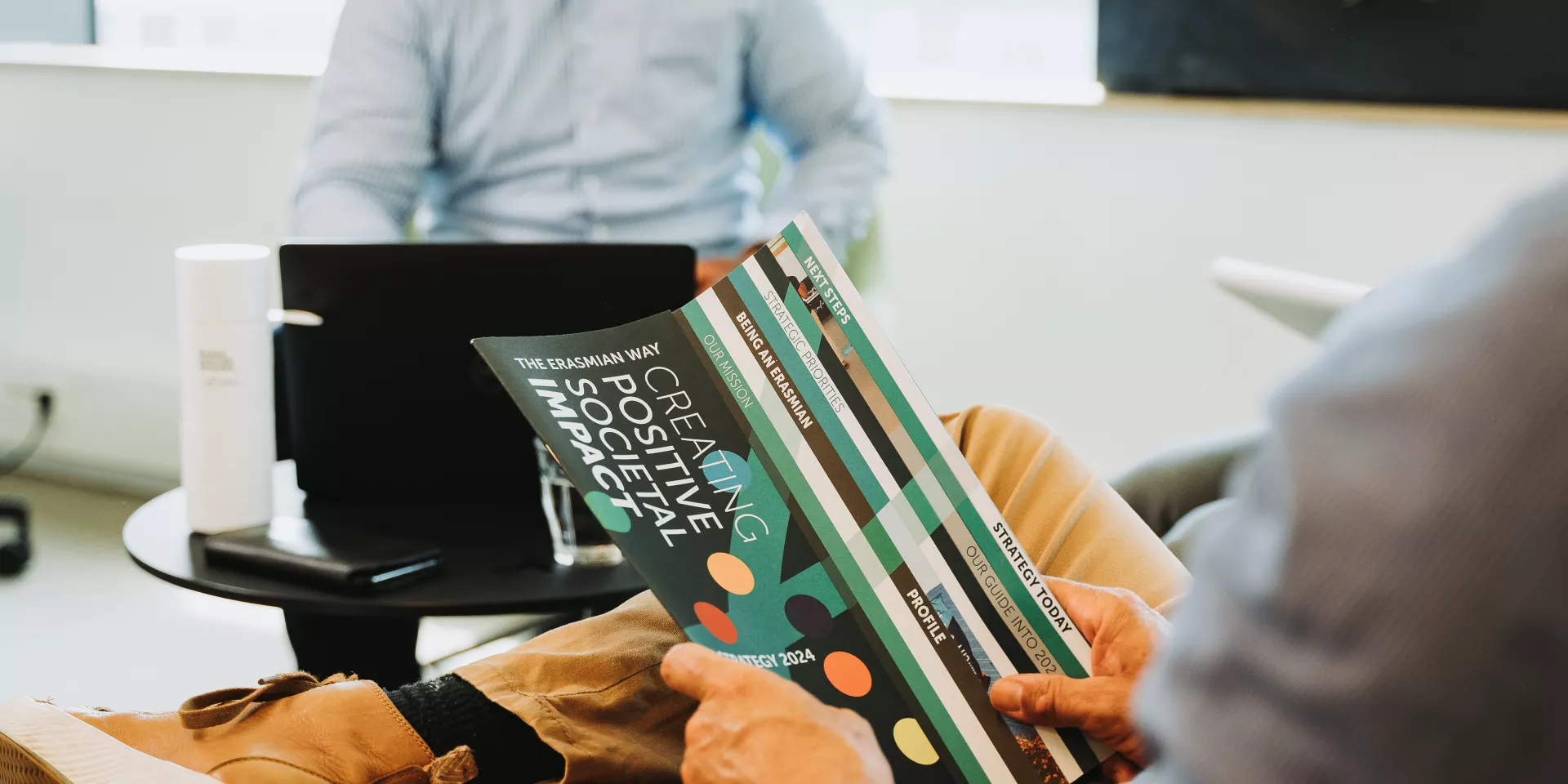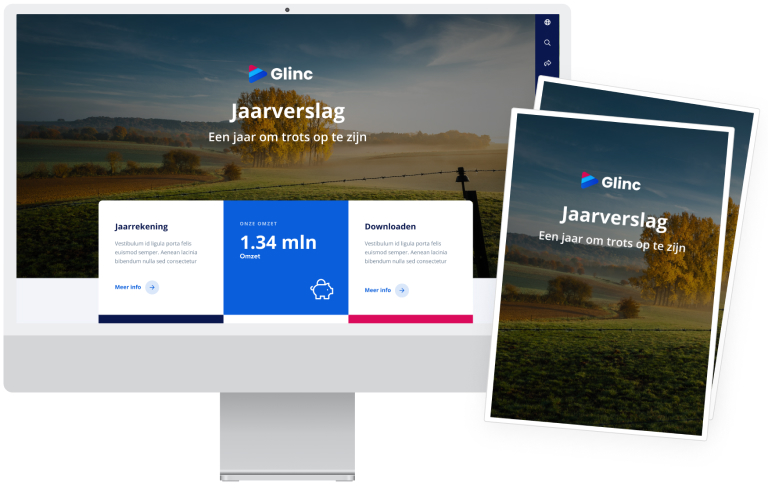
2024 Strategy
The mission of Erasmus University Rotterdam (EUR) is to ‘Create positive societal impact’. With Strategy 2024, we make a societal contribution and take responsibility for the challenges facing our society.
The focus in the initial years of Strategy 2024 lay on the implementation and expansion of the strategic initiatives. The strategy reached maturity in 2022. We found ourselves confronted with national and international developments that demanded a broad, multidisciplinary approach, to which EUR is keen to contribute based on its mission.
Interim strategy evaluation
Halfway through the current strategic period, the Executive Board commissioned an interim evaluation by an external panel in 2022. The aim was to learn together from the first phase and thus identify a number of specific proposals for improvement for the second phase of the strategy. The panel welcomed the fact that, unlike previous editions of EUR strategy, the current strategy was developed in co-creation and based on a bottom-up approach. The current strategy arose from a desire to establish links and build bridges – not only between faculties but also between the faculties and Professional Services.
The panel concluded that, as a university, we can be proud of our strategy and the associated Erasmian values: Strategy 2024 is contemporary and responds to modern-day challenges. Internally, the strategy has brought the faculties and services closer together. The panel nevertheless believes that there is further scope to improve synergy.
Externally, the strategy has led to closer collaboration with the municipality of Rotterdam and a joint focus on regional impact, which is reinforced by initiatives such as the Convergence EUR-TUDelft-Erasmus MC.
The panel made a number of recommendations on the basis of this evaluation to tighten and adjust the strategic direction whilst retaining the key strategic ambitions. A clearer focus with impact as the central theme. In addition, the panel recommended that better use is made of the university’s interdisciplinary potential and the formulation of a targeted approach to this end. Implementation of the recommendations commenced in 2022 and will continue for the remaining duration of Strategy 2024.

Separate evaluation of education
A separate evaluation of education was carried out in 2022. The strong, value-driven approach to education within EUR was regarded as positive. Students and alumni are connected to the outside world and seek to understand societal challenges. Lecturers support students in developing their expertise, including by providing an impact-driven learning environment where students tackle complex problems that sometimes require a multidisciplinary approach. Key social developments are increasingly embedded in the curriculum.
The main recommendation was to define impact-driven education more specifically and to link this to value development by students in the context of their personal and academic professional learning.
Erasmian values as our stepping stone
The interim strategy evaluation made specific reference to the appeal of the Erasmian values and acknowledged their unifying role. The Erasmian values are: world citizenship, socially engaged, connecting, an entrepreneurial spirit and open mindedness. However, it is also about how we translate these values: innovative and based on a diverse range of backgrounds and views, always working together and in co-creation, action-oriented and unconventional where necessary and therefore with courage.
The Erasmian values are now well known and widely regarded as the shared values of our university. They increasingly guide the way in which we want to create impact, although everyone has their own interpretation of the values. In the last year, we have witnessed the Erasmian values increasingly come to life within EUR through numerous initiatives, both big and small.
Further emphasis will be placed on the connection with culture and leadership based on these values in the period ahead. This will take place within the EUR leadership programme launched in 2022. The Erasmian values and being an Erasmian will also play an even more emphatic and explicit role in EUR strategy over the coming years.
EUR’s impact ambitions
Impact is the central theme of the university’s strategy. Various dialogues took place on the definition of impact in 2022 with the aim of achieving a better understanding and sharper strategic focus. Our impact ambitions benefit from a more conscious and targeted approach to impact, that focuses on specific and current societal challenges. We ensure that conscious thought is given to the intended impact or social effect and how best to achieve this.
In everything that we do, we also ask ourselves what social change our actions are geared towards and how we can organise these actions in order to realise this change or at least increase the likelihood of the change occurring. A vital element is that, wherever possible, we do not determine what our impact can and should be alone, but that we do this in consultation with our environment and perhaps even at the initiative of this environment from the outset. This applies to each of the steps we follow in the process of creating impact. By doing so we are creating the enabling conditions for the transition to an impact-driven university where social engagement becomes a third pillar within our academic setting alongside research and education.
Sustainability as an aspect of impact
Sustainability issues took centre stage at both global and national level in 2022. Sustainability is also an important topic within EUR’s impact ambitions. Current social developments are resulting in a growing awareness within EUR that our impact needs to make a positive contribution towards solving the climate change problem, and fast. We took specific action in a number of areas in 2022, for example by working towards sustainable operational management to ensure that EUR makes an eco-positive contribution. We also use information about how our research and education contributes to the Sustainable Development Goals to allow an even more targeted approach to our impact ambitions.
In this context, we worked to develop more interdisciplinary and transdisciplinary electives and specialisations. These offerings will produce professionals that include the future experts who can help improve sustainability in the medical, cultural and socioeconomic domains. Moreover, our research is increasingly focused on more healthy living environments, greater biodiversity and more equal opportunities in society. We do this in collaboration with social partners. Our campus itself is a sustainable study and work environment, with healthy food and sustainable transport options. 2022 also saw a focus on the permanent dialogue that we, as a knowledge institute, are maintaining on this topic with our students and staff. The campus occupation in November once again made it clear that it is important to keep talking to each other about our goals and endeavours.
Recognition and rewarding of academics
The national Recognition and Rewards programme was launched in 2019 with the publication of the essay ‘Room for everyone’s talent’. Now, three years on, the importance of modernising the current system has become even clearer. Such an approach fits in with global trends in research and education and is in line with EUR’s own impact ambitions. It demands a broad cultural change with goals that focus on the diversification of career paths, a stronger emphasis on quality, balance between individual and team, the importance of good academic leadership and the promotion of open science.
Recognising and rewarding the efforts of our employees is vital in order to achieve EUR’s strategic objectives. This includes shaping career prospects with scope for high-impact activities. If we want our academics to think in a more structured way about and work on creating social impact, we need to support, recognise and reward these activities. This means, for instance, taking these activities into account in the appraisal and promotion of academic staff, redefining Performance and Development (P&D) interviews and updating the assessment criteria.
The Executive Board emphasises the importance of Recognition & Rewards and made additional funding available for its implementation. The programme team was expanded to actively support the faculties and services. New formats for the annual P&D interviews and promotion procedures are currently being trialled in a number of faculties. Differentiated career paths are also being developed and implemented to some extent in some faculties.
The power of collaboration
Societal problems require an integrated approach and therefore new forms of knowledge and knowledge development that are only possible if disciplines grow towards each other and converge. Internal and external collaboration therefore a key precondition when it comes to achieving our impact ambition.
Within EUR, collaboration is shaped and encouraged by the Erasmus Initiatives, which consist of four programmes aimed at increasing the societal and economic impact of education and research.
EUR is involved in a number of regional strategic alliances. In 2019, TU Delft, Erasmus University Rotterdam and the Faculty of Medicine and Health Sciences/Erasmus MC launched an intensive cross-disciplinary and cross-institutional partnership. This partnership brings together and reinforces knowledge and expertise on socioeconomic, medical and technical sciences. In 2022, we continued to build on the foundations already laid. A great deal has been achieved thanks to the efforts of all involved. Examples include a large number of new research and education activities within the substantive programmes, the signing of a partnership with the municipalities of Rotterdam and Delft, and the first steps in the further organisational development of the Convergence Alliances of EUR, the Faculty of Medicine and Health Sciences/Erasmus MC and TU Delft.
EUR has teamed up with Leiden and Delft in the LDE partnership in pursuit of social relevance at regional and global level. This partnership is organised in LDE Centres and programmes that play a unique role in achieving innovative interdisciplinary and multidisciplinary cooperation in research and education.
On 20 January 2022, the governors of Rotterdam University of Applied Sciences/Willem de Kooning Academy, Codarts University of the Arts and EUR signed a letter of intent to give a major boost to arts education in Rotterdam: University of the Arts Rotterdam: Culture&Campus. This is a new entity that will be affiliated with both Rotterdam University of Applied Sciences and Erasmus University Rotterdam. The municipality of Rotterdam will support this special initiative, which will be positioned within the Culture&Campus cooperative arrangement.
We not only strengthened our regional alliances, but also welcomed ten universities from across Europe to EUR for the UNIC Strategic Conference in Rotterdam. UNIC is a major European alliance of ten universities in post-industrial cities, with EUR as coordinator. The universities of Malmö and Lódz joined UNIC in 2022.

SPOTLIGHT
EUR receives universities from across Europe
In October, the European University of Post-Industrial Cities (UNIC) held a strategic conference on the Erasmus University Rotterdam campus. Ten alliance partners from across Europe came together to discuss ideas and best practices to build the future of European education, and to discuss the collective future of the alliance.
